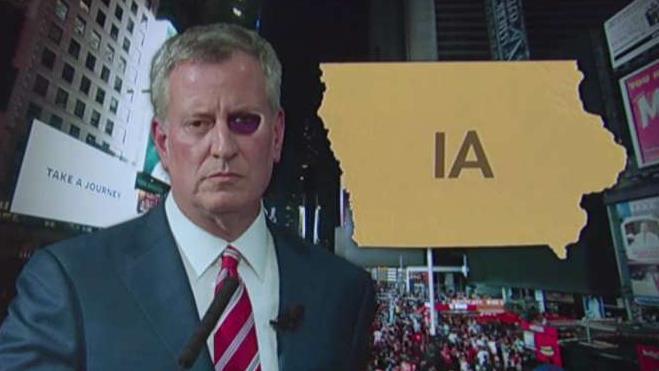How de Blasio's 'workers' bill of rights' could impact small businesses
New York Mayor and Democratic presidential candidate Bill de Blasio unveiled his proposed “workers’ bill of rights” Tuesday, promoting a $15 minimum wage, mandated paid vacation and protections for unions.
What would those kinds of changes mean for small businesses? Advocates and small business owners in New York, like Andreas Koutsoudakis, told the Daily News that the measures would hurt them.
“There’s nothing wrong with helping people out, giving some better conditions for employees, but that only works if there’s some breathing room for small businesses,” said Koutsoudakis, who owns Tribeca’s Kitchen with his father. “The little guy is stuck in the middle.”
In addition to instituting a $15 minimum wage, de Blasio’s plan calls for raising the threshold for salaried workers who can earn time-and-a-half when working overtime, so that anyone who earns less than $50,000 per year would qualify when working more than 40 hours per week. He also supports giving more power to the Department of Labor to protect workers from wage theft.
Sam Lam, who owns Tenchodo Laundromat in Queens, questioned how a “struggling business” can pay for the mandates proposed by de Blasio.
“It’s punishing to hire a worker at this point,” he told the Daily News.
In Emeryville, California, a national-high $16.30 minimum wage recently forced restaurant owner Marcos Quezada to eliminate the dinner shift and lay off six of his 10 workers, The Wall Street Journal reported.
“I just didn’t see how I was going to survive it,” he told the newspaper.
The Congressional Budget Office released an analysis this month which projected a $15 minimum wage would lift 1.3 million Americans out of poverty, but would also cost about 1.3 million jobs.
If businesses don’t respond by cutting staff, they could be forced to put their increased costs on customers. At another Emeryville restaurant, the owners raised prices but told the Journal the move still didn’t cover the added labor costs.
Greg Biryla, New York state director of the National Federation of Independent Business, told the Daily News that businesses could be forced to close if the government adopts de Blasio’s plans.
“When regulations like those proposed by Mayor de Blasio apply to all employers, small businesses suffer most because they often lack the administrative and financial resources of their corporate big-box competitors,” he said.
Freelancers and gig economy workers -- like rideshare app drivers -- would get some of the same protections as traditional employees under de Blasio’s plan. Those workers would be entitled to minimum wage, workers' compensation and unemployment insurance.
CLICK HERE TO GET THE FOX BUSINESS APP
To promote his plan, de Blasio pointed to worker policies New York has implemented during his time as mayor, including a $15 minimum wage for city employees, a paid sick days law, fair scheduling for fast food and retail workers and protections for freelance and gig workers.
“The mayor’s proven in New York City that policies that help workers cannot only coexist with thriving small businesses, but make them stronger,” de Blasio spokeswoman Jaclyn Rothenberg told the Daily News. “By raising the minimum wage and implementing policies like paid sick leave, we’ve put money back in hands of working people, allowing them to actually spend more.”
The mayor has also proposed mandating two weeks of paid personal time each year, plus guaranteed paid sick days, medical leave and family leave. His plans for “family first scheduling” would give workers notice of their schedule at least two weeks in advance and entitle them to compensation if scheduled work is canceled.
“There’s this misconception that employers don’t relate to their employees,” Koutsoudakis told the Daily News. “Nobody’s giving my father a day off and he works six days a week.”




















